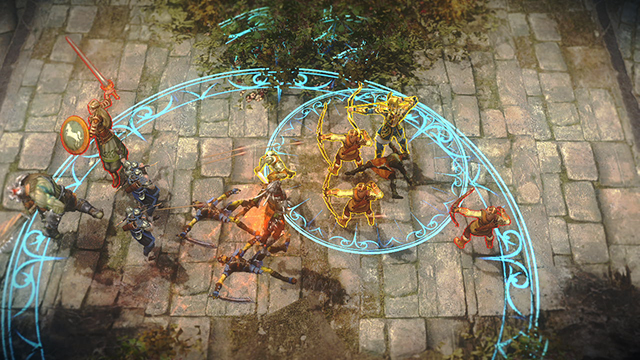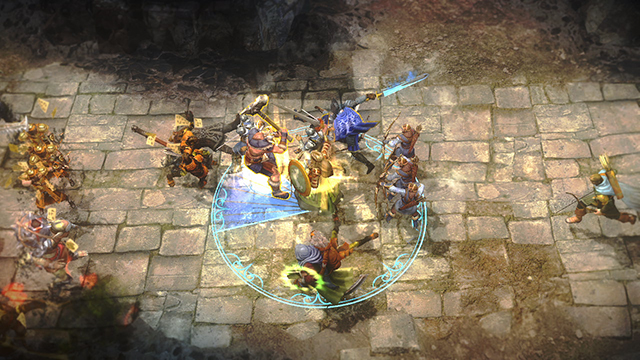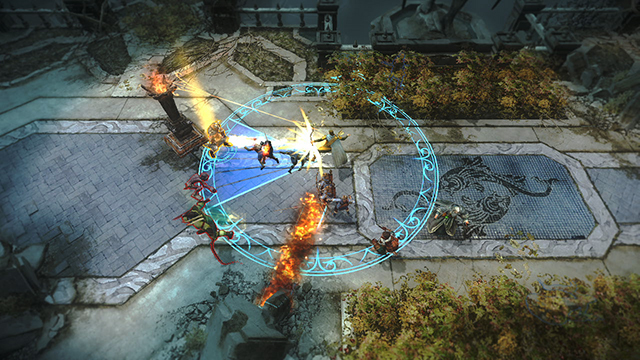Far over the Misty Mountains cold
Two teams of five fight for control
It’s a MOBA, just like Dota
But less complex, with no shop or gold
“What’s a MOBA?” You might just ask
It’s an action-RPG with a simple task
You have three lanes and skills to train
Heroes and villains make up the cast
You pick one fighter as your avatar
And with your minions, you travel far
You must erase the other base
And with the other team you’ll spar
Alright, enough of that. Guardians of Middle-earth is a multiplayer online battle arena game (MOBA), a genre made famous by the Defense of the Ancients mod for Warcraft III. You can kind of think of it as a real-time strategy game, like Warcraft III, but you just control one unit in team-based matches (generally 5-vs.-5).
The objective is to destroy the other team’s base. Sound simple? No. No, it’s not. This is one of the most complex and least forgiving genres you’ll find. You could spend a hundred years learning its rules and still discover nuances. If I spent this entire intro explaining how the game worked, you would be bored, and I would be fired.
Guardians attempts to not only bring MOBA to the PlayStation 3 and Xbox 360 (it’s out now), but it simplifies the experience at the same time. That’s sort of like trying to turn a soufflé into something you can order at McDonald’s. But against odds greater than trying to simply walk into Mordor, it succeeds.
Mostly.
What You’ll Like
MOBA made easy
The multiplayer online battle arena has never been the most welcoming of genres. Games like Defense of the Ancients and League of Legends are famous for their tough, often mean communities. It’s because these games are hard to play, with complicated rules that require hours to understand and skills that take a lot of training to use effectively.
Guardians of Middle-earth, while still very much a MOBA at its core, works to make its take on team-based lane-pushing simpler. The overall map is about half of the size of what is normal for the genre. Not only does this mean you have to take out fewer towers to advance, but the jungle, the area of the map filled with nonplayer controlled monsters, is much smaller. This means that” jungling,” where a player focuses on fighting these creatures for experience, status buffs, and gold, is far less effective and thus far less of a concern.
Speaking of gold, the biggest simplifier in the game is the lack of any currency or a shop during matches. The acquiring and spending of money to buy equipment is usually one of the trickiest aspects of a MOBA. Its exclusion may annoy genre purists, but this goes a long way toward putting everyone on a level playing field without having to look online for a guide that’ll tell them what kind of armor they should buy when they hit level 6.
These changes also make matches a lot shorter than what you would find in other MOBAs. While a game of Defense of the Ancients can easily take an hour to play, a round of Guardians rarely takes more than 20 minutes.
Designed for consoles
These changes all make sense, since developer Monolith designed Guardians for consoles, a rarity for a genre that has historically appealed to a hardcore PC crowd. Surprisingly, Guardians works great with a controller thanks largely to handy circles and cones that always tell you where your skills will hit, which helps make up for aiming that’s less precise than what you would get with a keyboard and mouse.
In some ways, using a controller works better, especially when it comes to controlling your character. Using an analog stick just feels easier and less prone to accidents than clicking around a map.
Love that Lord of the Rings flavor
Still, despite these drastic differences from its contemporaries, most will look at Guardians as a MOBA game with a The Lord of the Rings skin. So if you’re primarily interested in Guardians of Middle-earth because you’re a Tolkien fan looking to satiate an appetite for wizards and orcs, you’ll be happy to know that Guardians uses its license well.
Its cast of fighters includes multiple heroes and villains from The Hobbit and The Lord of Rings books, including favorites like Gandalf, Gollum, Sauron, and Legolas. Some of the cast is more obscure, like Lugbol the orc (who?) and Arathorn, who takes a spot on the roster that Monolith should have given to his far more famous son, Aragorn. Still, hardcore Middle-earth enthusiasts will appreciate the inclusion of these lesser-known characters, even if fans who are only familiar with the movies will scratch their heads as they try to figure out who Hildifons the Hobbit is.
Most importantly, each character feels distinct. You can have a lot of fun simply experimenting with this large and varied cast until you discover a few favorites. While some are unavailable until you buy them with in-game currency that you earn outside of matches, it doesn’t take long before you can unlock a good chunk of the roster.
What You Won’t Like
Lagolas (Get it? I combined lag and Legolas into one word. Funny, right?)
Sadly, lag has been an issue with my time with Guardians, though the problem seems to improve each day. It was virtually unplayable on Dec. 5, the game’s release day on the 360. I couldn’t last two minutes without getting booted from a match due to connectivity issues. If I wasn’t kicked out, then I had to suffer matches where characters plodded along like jittery phantoms.
Like I said, this issue has improved over time, but I still find instances where a server problem will cause me to miss an important attack or a teammate gets kicked out of the match, forcing me to play an unfair game of five versus four. Timing and precision is crucial in a MOBA, so any lag is a major problem.
Shrines
One addition that Guardians does make to the traditional MOBA formula is the inclusion of shrines, basically control points across the middle of the map that give your team buffs to things like defense and attack speed. Unfortunately, since they’re all in the center, the first team with a slight advantage is likely to gain control of all four, making a comeback from the other side almost impossible. Playing defense against a team that’s inside your base is already hard enough without these additional buffs.
Comebacks are a rare thing in MOBAs, but at least others give you the option to surrender when victory seems impossible. Guardians forces you to stick it out, even when it’s clear you’re going to lose ten minutes before your base is actually destroyed.
Long waits for games
Searching for a match can take upward of five minutes, during which time you won’t have much to do. This is usually a problem with the genre, but at least with the PC MOBAs you can always do something else on your computer while you’re waiting for the game to find you a match.
Conclusion
Guardians of Middle-earth sacrifices a lot of complexity to work as a console game. Hardcore MOBA fans will disapprove of the changes, but genre newbies looking for some team-based, Tolkien-inspired fun will happily take these heroes and villains to war. It’s nice to worry more about killing enemies and destroying towers than last hitting minions for an extra bit of gold so you can buy some expensive armor.
Of course, the shorter, easier victories you’ll experience in Guardians will never satisfy you as much as a win that took over an hour to achieve in Dota, but it’s also nice when a few losses in a row don’t make you feel like you just wasted an entire day of your life.
Score: 70/100
Guardians of Middle-earth was released on Dec. 4 for the PlayStation 3 and Dec. 5 for the Xbox 360. The publisher provided GamesBeat with a download code of the 360 version for the purposes of this review.

VentureBeat's mission is to be a digital town square for technical decision-makers to gain knowledge about transformative enterprise technology and transact. Learn More





